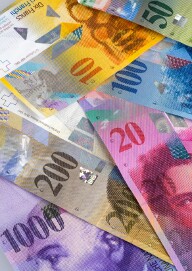The Swiss franc is gaining against a basket of currencies on Thursday, supported by the governmentâs federal budget surplus forecast. As the economic powerhouse introduces tax and pension reforms, the government thinks it will take in more revenues. But the healthy state of the nationâs finances is not making investors optimistic on the economy.
On Wednesday, the Swiss government introduced a draft 2020 budget, outlining a $613 million surplus. Although the government will implement reforms to taxes and pensions next year, it expects revenues to jump 2.9% in 2020 and spending to climb 3.7%. Overall, policymakers are anticipating surpluses in 2021, 2022, and 2023.
Last year, Switzerland recorded a federal budget surplus of $3 billion, which was 10 times higher than projected in the previous year.
Despite a healthy public purse, investors are not jubilant. The CS-CFA Society Economic Sentiment Index, a measurement of how investors feel about the economy, fell to -30 this month. In May, the index clocked in at -14.3. The last time the index was in positive territory was in June 2018 when it read eight.
The KOF Economic Barometer for Switzerland, a gauge of business confidence, will be released on Friday. It estimated to come in at 94.9 for June, which would be up from 94.4 in May.
Investors will now look to retail sales, manufacturing data, and inflation numbers next week for the francâs direction.
Switzerlandâs diminishing relations with the European Union has been driving the franc in recent trading sessions. After the EU proposed to end its stock market equivalence to Switzerland, Zurich responded by making it public that it is considering prohibit Swiss shares from participating in EU stock exchanges.
The USD/CHF currency pair tumbled 0.13% to 0.9768, from an opening of 0.9779, at 14:14 GMT on Thursday. The EUR/CHF dipped 0.1% to 1.1106, from an opening of 1.1120.
If you have any questions, comments, or opinions regarding the Swiss Franc, feel free to post them using the commentary form below.
Swiss Franc Gains on Budget Surplus Forecast, Capped by Weak Sentiment
